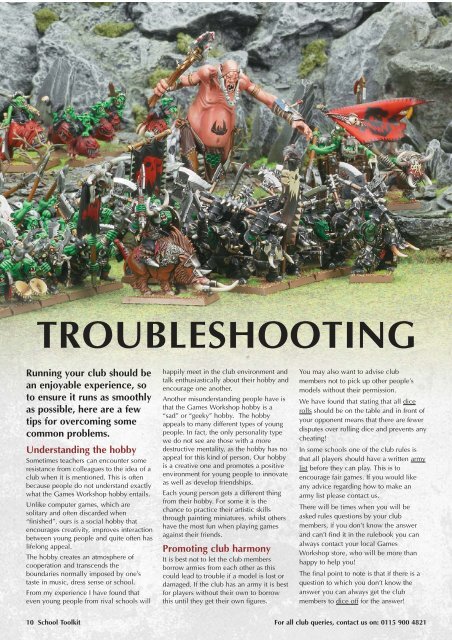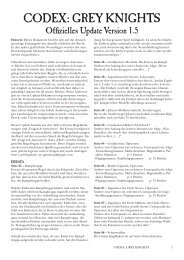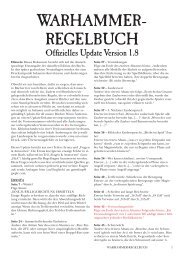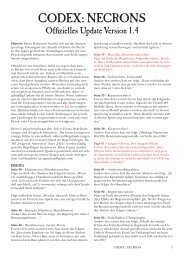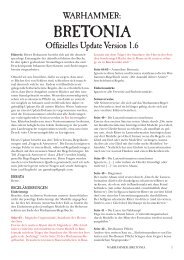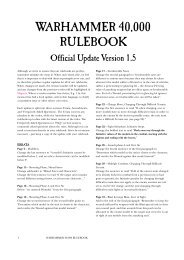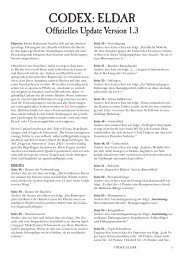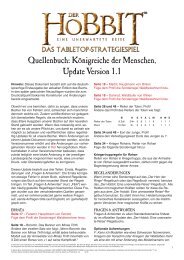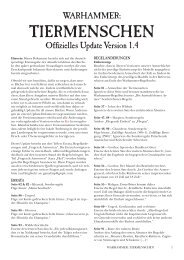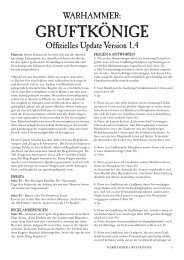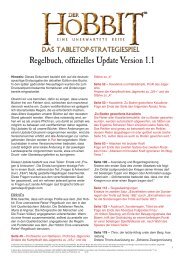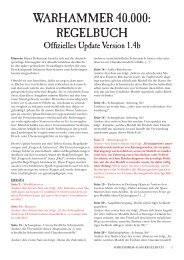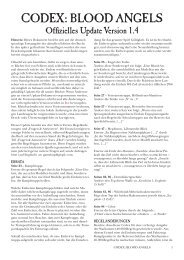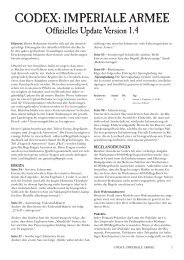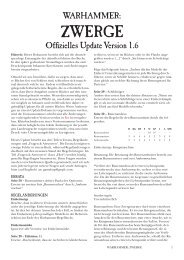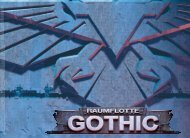School Toolkit 2010 - Games Workshop
School Toolkit 2010 - Games Workshop
School Toolkit 2010 - Games Workshop
You also want an ePaper? Increase the reach of your titles
YUMPU automatically turns print PDFs into web optimized ePapers that Google loves.
TROUBLESHOOTING<br />
Running your club should be<br />
an enjoyable experience, so<br />
to ensure it runs as smoothly<br />
as possible, here are a few<br />
tips for overcoming some<br />
common problems.<br />
Understanding the hobby<br />
Sometimes teachers can encounter some<br />
resistance from colleagues to the idea of a<br />
club when it is mentioned. This is often<br />
because people do not understand exactly<br />
what the <strong>Games</strong> <strong>Workshop</strong> hobby entails.<br />
Unlike computer games, which are<br />
solitary and often discarded when<br />
“finished”, ours is a social hobby that<br />
encourages creativity, improves interaction<br />
between young people and quite often has<br />
lifelong appeal.<br />
The hobby creates an atmosphere of<br />
cooperation and transcends the<br />
boundaries normally imposed by one’s<br />
taste in music, dress sense or school.<br />
From my experience I have found that<br />
even young people from rival schools will<br />
happily meet in the club environment and<br />
talk enthusiastically about their hobby and<br />
encourage one another.<br />
Another misunderstanding people have is<br />
that the <strong>Games</strong> <strong>Workshop</strong> hobby is a<br />
“sad” or “geeky” hobby. The hobby<br />
appeals to many different types of young<br />
people. In fact, the only personality type<br />
we do not see are those with a more<br />
destructive mentality, as the hobby has no<br />
appeal for this kind of person. Our hobby<br />
is a creative one and promotes a positive<br />
environment for young people to innovate<br />
as well as develop friendships.<br />
Each young person gets a different thing<br />
from their hobby. For some it is the<br />
chance to practice their artistic skills<br />
through painting miniatures, whilst others<br />
have the most fun when playing games<br />
against their friends.<br />
Promoting club harmony<br />
It is best not to let the club members<br />
borrow armies from each other as this<br />
could lead to trouble if a model is lost or<br />
damaged. If the club has an army it is best<br />
for players without their own to borrow<br />
this until they get their own figures.<br />
You may also want to advise club<br />
members not to pick up other people’s<br />
models without their permission.<br />
We have found that stating that all dice<br />
rolls should be on the table and in front of<br />
your opponent means that there are fewer<br />
disputes over rolling dice and prevents any<br />
cheating!<br />
In some schools one of the club rules is<br />
that all players should have a written army<br />
list before they can play. This is to<br />
encourage fair games. If you would like<br />
any advice regarding how to make an<br />
army list please contact us.<br />
There will be times when you will be<br />
asked rules questions by your club<br />
members, if you don’t know the answer<br />
and can’t find it in the rulebook you can<br />
always contact your local <strong>Games</strong><br />
<strong>Workshop</strong> store, who will be more than<br />
happy to help you!<br />
The final point to note is that if there is a<br />
question to which you don’t know the<br />
answer you can always get the club<br />
members to dice off for the answer!<br />
10 <strong>School</strong> <strong>Toolkit</strong> For all club queries, contact us on: 0115 900 4821


